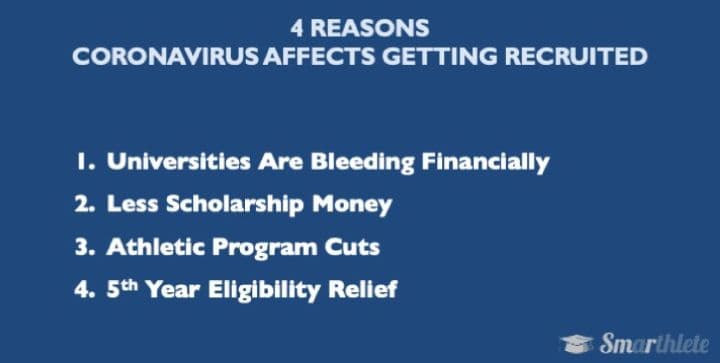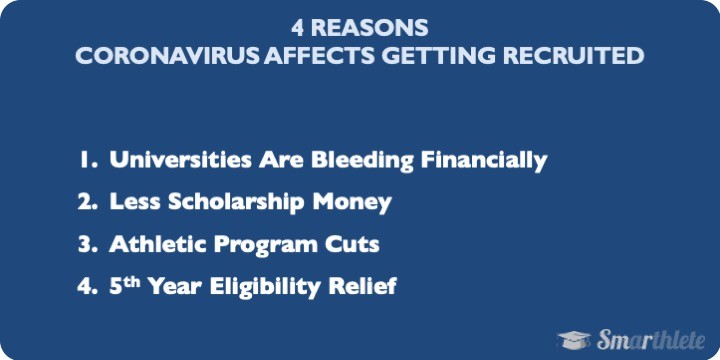4 Reasons 'Corona' Affects Getting Recruited

In March, we were dealing with a topic here as part of our "Friday Scholarship Guide" Series that none of us ever thought we'd write about:
"Does The Coronavirus Affect My Recruiting Process"
3 months later we need to circle back and need to be more specific by saying: that article dealt with the short-term consequences of the pandemic only - which is why here's a second one on the long-term consequences.
3 months later all of us are much wiser than before and we can assess the consequences way better.
3 months later we know that some sports are heavily impacted and it remains to be seen how the future of some college sports will evolve.
Let's have a look at what's going on:
1. Universities Are Suffering Financially
Depending on where in the world you are, chances are you read the exact same news as another person on the other side of the globe: the unemployment rate is up, businesses collapse across industries, and governments talk economic aid programs in order to keep the "old normal" afloat. With that comes a massive reduction in traveling, especially air traffic.
While some countries are doing better and others worse, it's hard to imagine a country being completely spared from feeling any sort of impact, considering the economy and trade relations are of such global extent. The universities are in the same boat: Earlier termination of the academic year 2019-20, reduction in student enrollment for academic year 2020-21, cancellation of revenue-generating events, potential decline in donations from outside sponsors, corporations or alumni.
Simply put: universities just like any other business are faced with a situation where the cost structure is still the same (or close to that), but they are facing a hit in revenue (projections). Add to that insecurity of what 2020-21 looks like (depending on politics & the upcoming development all things Covid-19) and you have a situation in which universities are closely monitoring the cost side of things.
Remember the global financial crisis more than 10 years ago? It took a bit of time until schools (just like businesses) recovered or adjusted to the new situation. Depending on the financial stability of the institution, it likely will be a similar process.
2. Less Scholarship Money
That's a starting point. Unfortunately. A NCAA D2 women's soccer program may offer a maximum of 9.9 scholarships to its student athletes. Let's assume the school costs 50k USD/year. That's a saving of 500k USD per year right there, if the scholarships were to go away entirely (more on that below). But even a reduction by 50% is quite a bit of cash and something university administrations might ask their athletic departments to look at these days. On top of savings thanks to reduced scholarship budgets, there're more savings to come from operating budgets (travels, gear, coaches salaries, etc.).
Schools that have been more affected or that have already been in a worse situation before Covid-19 may find themselves under more pressure to reduce scholarship budgets. Don't just think athletic scholarship budgets, but also other forms of aid, such as academic scholarship budgets.

3. Athletic Program Cuts
If the above doesn't help or just doesn't suffice, college sports programs may be discontinued by the university administration. The college universe has seen this happening over the last couple of weeks and it's likely not over.
Just to be on the same page here: this does happen all the time (even before Corona). Schools cut athletic programs, whereas others open new ones. Often, it has to do with rules and regulations ("Title IX", number of minimum programs, schools moving from one division to another, etc.) and often it's a numbers game (a team with lots of athletes also generates revenue for the school, due to the costs of attendance). But the last weeks have seen an increasing number of announcements that programs are being discontinued (D1 Tracker), which is truly a sad trend. It's important to understand that revenue-generating sports (e.g. basketball) are less likely to be cut compared to non-revenue-generating sports (e.g. golf).
This is a tough one to swallow for coaches and student athletes affected and ultimately leads to a situation where the same pool of athletes (skilled enough to play college sports) competes for fewer spots. But there's even more that adds to the mix ...
4. 5th Year Eligibility Relief
Due to the fact that Covid-19 led to a cancellation of spring sports competitions (NCAA and NAIA), both associations decided that all affected student athletes would be given the chance to compete for a fifth year. You might know that eligibility is usually limited to 4 seasons of competition, but here's a situation which sees a lot of athletes thinking: "Hey, not bad. I still love to compete and improve and I can get myself a graduate degree for less money, due to me being able to receive an athletic scholarship for another year."
Depending on the sport, the additional fifth year for those affected leads to even more athletes competing for the same (or remember: fewer) number of scholarships/roster spots. Just to clarify: if you were playing your freshman season in 2019-20, but you had to pack your things and go home in March without finishing the season due to Covid-19, that means you'll be able to compete through 2023-24 instead of 2022-23. In turn, future recruiting classes will be affected until that recruiting cycle has been finalized.
What Does This Mean For My College Recruiting Process?
- You gotta be on top of things early on to get yourself in a good position to get recruited.
- Grades and test results matter (perhaps even more than ever before).
- Be proactive and understand what your recruiting process is going to look like. Am I one of the top recruits and will get scouted no matter what (a tiny % of athletes are) or am I the kind of recruit who needs to take responsibility and plan the recruiting process carefully; namely working with my family, coach and/or a recruiting service?
- Continue to work really hard (practice and class room. It will pay off, promise!
We understand that changes like these are concerning. It's important you are aware of them, in order for you to not be at a disadvantage.
Our offer for you is simple:
Regardless your preference of working with a recruiting service or getting recruited primarily on your own, we have a solution for you:
- Recruiting Profile on Smarthlete
Among other things, access to our university database for your sport - including updates whenever programs are being discontinued during the year.
("Get started") - College Placement - work with a recruiting expert
We navigate you from A to Z, from start to end, from getting your highlight reel done to moving into your dorm in college.
("Get started")
Stay tuned on what's going on in college and in the college recruiting universe:
Sign up for our newsletter and get future editions of our Friday Scholarship Guide fresh in your inbox. (Find the sign-up form on the right hand side of this page.)
Sneek peek: Next week's edition of our Friday Scholarship Guide will be a guest post by an advocate of athletics, which should be considered central to the educational journey of students and thus should not be at the centre of potential savings considerations.